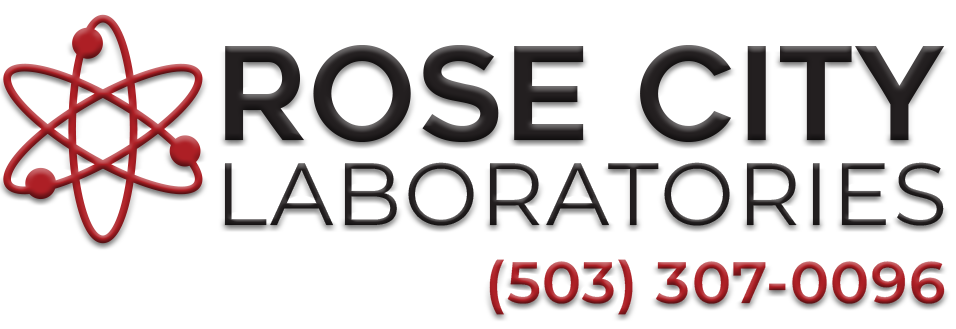
OREGON’S ONLY FULLY
FULLY LICENSED AND accredited
Psilocybin / FUNGI Testing Laboratory
Licensed Psilocybin & FUNGI Testing LAB
ROSE CITY LABORATORIES is a ORELAP Accredited Psilocybin Testing Laboratory & State Licensed by OHA/OPS
see accreditation see license
Ask about our certified testing packaging program
We are a Fully Licensed Psilocybin Testing Laboratory in Oregon. We test for psilocybe cubensis and all strains for psilocybin potency.
What does Total potential psilocin mean? What are the other tryptamine compounds found in psilocybin? We help our clients understand each analytical report.
In naming Rose City Laboratories the first company to be allowed to do the psilocybin testing, the Oregon Health Authority said: “Accurate labeling of psilocybin potency allows clients to participate in administration sessions with products that meet their needs.”
Oregon Psilocybin Services has issued testing requirements. Here is an overview of the current rules:
-
Speciation Testing (333-333-7030)
(1) A manufacturer must order a test for a batch taken from the first harvest lot recorded in a calendar year to ensure that the lot consists only of Psilocybe cubensis. This test must be performed prior to transferring the harvest lot to another licensee or converting the harvest lot to another product type.
(2) Following the test described in section (1) of this rule, a manufacturer must order tests for one batch harvested in each month that a harvest lot is recorded to ensure that the lot consists only of Psilocybe cubensis.
(3) A batch fails speciation testing if the test demonstrates that the fungi is a species other than Psilocybe cubensis.
(4) If a batch fails speciation testing, a manufacturer must order tests for every harvest lot for a period of 12 months following the failed test to ensure that batches consist only of Psilocybe cubensis. This test must be performed prior to transferring the harvest lot to another licensee or converting the harvest lot to another product type.
(5) In addition to the requirements of section (1) of this rule, a manufacturer must submit one or more batches from a harvest lot or process lot for speciation testing upon written request by the Authority.
-
Potency Testing (333-333-7040)
(1) A manufacturer must order tests for every batch of finished psilocybin product from a harvest lot or process lot to determine the concentration (potency) of psilocybin and psilocin in the product.
(2) A process lot of homogenized fungi, psilocybin extract or edible psilocybin product fails potency testing if the amount of psilocybin or psilocin between samples taken from the batch exceeds 20 percent relative standard deviation between sample increments.
(3) In addition to the requirements of section (1) of this rule, a manufacturer must submit one or more batches from a harvest lot or process lot for potency testing upon written request by the Authority.
-
Solvent Testing (333-333-7050)
(1) If methanol or acetic acid are used to manufacture psilocybin extract, a manufacturer must order tests for methanol or acetic acid for every process lot of psilocybin extract prior to selling or transferring the psilocybin extract or converting to another product type.
(2) A batch fails solvent testing if a laboratory detects the presence of methanol above 3000 μg/g or acetic acid above 5000 μg/g in any sample.
(3) If a sample from a batch fails solvent testing, the batch may be remediated using procedures that would reduce the concentration of solvents to less than the action level.
(4) A batch that is remediated in accordance with section (3) of this rule, must be re-sampled and re-tested for solvents in accordance with these rules.
(5) In addition to the requirements of section (1) of this rule, a manufacturer must submit one or more batches from a process lot for solvent testing upon written request by the Authority.
-
Pesticide Testing (333-333-7060)
(1) A manufacturer must submit one or more batches from a harvest lot or process lot for pesticide testing upon written request by the Authority.
(2) A batch fails pesticide testing if the test detects the presence of a pesticide above action levels in any sample, including a field duplicate:
(a) During an initial test where no reanalysis is requested; or
(b) Upon reanalysis as described in OAR 333-333-7120.
(3) If a sample from a batch of psilocybin product fails pesticide testing, the batch may not be remediated and must be destroyed.
-
Contaminant Testing (333-333-7070)
(1) A manufacturer must submit one or more batches from a harvest lot or process lot for contaminant testing upon written request by the Authority.
(2) A psilocybin product required to be tested for contaminants under these rules must be sampled using appropriate aseptic technique and tested for total coliform count.
(3) If the presence of any fecal coliforms is detected the sample must be assessed for Escherichia coli (E. Coli)
(4) A batch fails microbial contaminant testing if the presence of E. Coli at more than 100 colony forming units per gram is detected in a sample.
(5) A psilocybin product required to be tested for contaminants may also be tested for aflatoxins and other harmful mycotoxins.
(6) A psilocybin product fails testing for aflatoxins and other harmful mycotoxins if the tests detect mycotoxins at levels that are unsafe for human consumption.
(7) If a sample from a batch of psilocybin product fails contaminant testing, the batch may not be remediated and must be destroyed.
-
Heavy Metals Testing (333-333-7080)
(1) A manufacturer must submit one or more batches from a harvest lot or process lot for heavy metal testing upon written request by the Authority.
(2) A harvest lot or process lot required to be tested for heavy metals may be tested for lead, cadmium, mercury and arsenic.
(3) A batch fails heavy metal testing if the presence of metals above the limits in section (4) of this rule are detected in any sample, including a field duplicate:
(a) During an initial test where no reanalysis is requested; or
(b) Upon reanalysis as described in OAR 333-333-7120.
(4) The limits for heavy metal testing are:
(a) Lead (Pb) above .5 μg/g.
(b) Cadmium (Cd) above .2 μg/g.
(c) Arsenic (As) above .2 μg/g.
(d) Mercury (Hg) above .1 μg/g.
(5) If a sample from a batch of psilocybin product fails heavy metal testing, the batch may not be remediated and must be destroyed.
FAQ & INFO
Is Psilocybin / Psilocin legal in Oregon?
In the United States, growing or possessing Psilocybe Cubensis mushrooms is illegal in all states, but it is legal to possess and buy the spores for microscopy purposes. However, as of On November 3, 2020, the state of Oregon decriminalized possession of psilocybin mushrooms for therapeutic use and granted licensed practitioners permission to administer psilocybin mushrooms to individuals age 21 years and older.
Measure 109 is the first state-wide introduction of a therapeutic mushroom program in the US
Oregon voters passed 2 ground breaking initiatives on Nov, 3, 2020:
Measure 109 legalized therapeutic use of Psilocybin and Psilocin and allows manufacture, delivery, administration of psilocybin at supervised, licensed facilities. These hallucinogenic compounds occur in several species of mushrooms around the world and have been traditionally used by indigenous peoples in their spiritual and medicinal practices. The historic Measure 109 gave the state 2 years to create a framework for growing, testing, and administering Psilocybin/Psilocin containing “magic mushrooms”.
Measure 110 decriminalized possession of small amounts of drugs, making them a class E violation under Oregon law, carrying $100 fine*. Possession of less than 12 grams of Psilocybin/Psilocin is a Class E violation in Oregon, and the penalty for possession of more than 12 grams was reduced from a Class B felony to a Class A misdemeanor.
*Federal laws allow the transfer and sale of spores but prohibit cultivation, use, and distribution of mushrooms that contain Psilocybin and Psilocin.
Psilocybe Cubensis?
Measure 109 is the first state-wide introduction of a therapeutic mushroom program in the country. The whole nation will be watching and taking note. Currently the OHA Oregon Psilocybin Services have decided to begin the program with only one species of mushroom, Psilocybe Cubensis, arguably the most common and most widely cultivated species of mushroom containing Psilocybin, in order to assure a smooth licensure and administration process.
Need Help?
We have compiled a Psilocybin Glossary to help answer questions and for clarification & reference
ADDITIONAL RESOURCES…
Good Reading…
“Terence and Dennis McKenna made Psilocybe Cubensis particularly famous when they published Psilocybin: The Magic Mushroom Grower's Guide in the 1970s upon their return from the Amazon rainforest, having deduced new methods, (based on pre-existing techniques originally described by J.P. San Antonio,) for growing psilocybin mushrooms and assuring their audience that Psilocybe Cubensis were amongst the easiest psilocybin-containing mushrooms to cultivate. Personal-scale cultivation of Psilocybe Cubensis mushrooms ranges from the relatively simple and small-scale PF Tek and other "cake" methods, that produce a limited amount of mushrooms, to advanced techniques utilizing methods of professional mushroom cultivators” https://en.wikipedia.org/wiki/Psilocybe_cubensis
The mild winters and constant rain of the Pacific NW create a mecca for mushroom enthusiasts.
Mushrooms have been a prized superfood and source of homeopathic medicine for thousands of years. They have recently hit the forefront of healing science as holistic practitioners find the natural benefits of various fungi while looking to get away from the pharmaceutical-heavy practices of western medicine. Our owner, Dan Huson, is a long-time advocate of the potential benefits of mushrooms. You can often find him foraging in the woods of the Pacific Northwest looking for rare and delightful fruiting fungi. We can test your mushroom products and extracts for purity and potency to ensure that you’re getting the most pure form of these beneficial compounds.






















